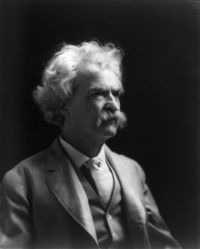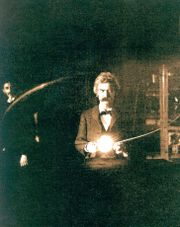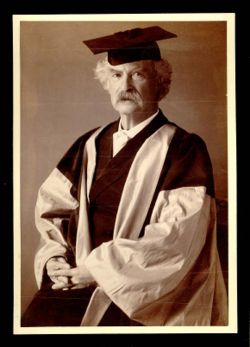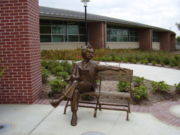Mark Twain
2007 Schools Wikipedia Selection. Related subjects: Writers and critics
 |
|
| Pseudonym(s): | Mark Twain |
|---|---|
| Born: | November 30, 1835 Florida, Missouri |
| Died: | April 21, 1910 Redding, Connecticut |
| Occupation(s): | Humorist, novelist, writer |
| Nationality: | American |
| Genre(s): | Historical fiction, non-fiction, satire |
Samuel Langhorne Clemens ( November 30, 1835 – April 21, 1910), better known by the pen name Mark Twain, was an American humorist, satirist, writer, and lecturer. Twain is most noted for his novels Adventures of Huckleberry Finn and The Adventures of Tom Sawyer (amongst other works), and his numerous quotes and sayings.
Although Twain was confounded by financial and business affairs, he enjoyed immense public popularity. His keen wit and incisive satire earned him praise from both critics and peers. Fellow author William Faulkner called Twain "the father of American literature."
Biography
Youth
Mark Twain was born in Florida, Missouri, on November 30, 1835, to John Marshall Clemens and Jane Lampton Clemens. When Twain was four, his family moved to Hannibal, a port town on the Mississippi River that would serve as the inspiration for the fictional town of St. Petersburg in The Adventures of Tom Sawyer and Adventures of Huckleberry Finn. At that time, Missouri was a slave state in the union and young Twain was familiar with the institution of slavery, a theme he later explored in his writing.
Twain was colorblind, a condition that fueled his witty banter in the social circles of the day. In March of 1847 when Twain was eleven, his father died of pneumonia. The following year, Twain became a printers apprentice and in 1851 began working as a typesetter and contributor of articles and humorous sketches for the Hannibal Journal, a newspaper owned by his older brother, Orion. When he was eighteen, he left Hannibal and worked as a printer in New York, Philadelphia, St. Louis, and Cincinnati. When he was 22 years old, Twain returned to Missouri. On a voyage to New Orleans down the Mississippi, the steamboat pilot, "Bixby", inspired Twain to pursue a career as a steamboat pilot, the third highest paying profession in America at the time earning $250 per month ($155,000 today), a "princely amount". Because the steamboats at the time were constructed of very dry flammable wood no lamps were allowed, making night travel a precarious endeavor. A steamboat pilot needed a vast knowledge of the ever-changing river to be able to stop at any of the hundreds of ports (to take on and discharge passengers and freight) and wood-lots along the river banks (to purchase fuel for the steam boilers). Twain meticulously studied 2000 miles of the Mississippi for more than two years until he finally received his steamboat pilot license in 1858. He worked as a river pilot until the American Civil War broke out in 1861 and traffic along the Mississippi was curtailed.
Traveling in the West
Missouri, although a slave state and considered by many to be part of the South, declined to join the Confederacy and remained loyal to the Union. When the war began, Clemens and his friends formed a Confederate militia (an experience he depicted in his 1885 short story, " The Private History of a Campaign That Failed"), but he saw no military action and the militia disbanded after two weeks. His friends joined the Confederate Army; Clemens joined his brother, Orion, who had been appointed secretary to the territorial governor of Nevada, and headed west. They traveled for more than two weeks on a stagecoach across the Great Plains and the Rocky Mountains to the silver-mining town of Virginia City, Nevada. On the way, they visited the Mormon community in Salt Lake City. Clemens' experiences in the West contributed significantly to his formation as a writer, and became the basis of his second book, Roughing It.
Once in Nevada, Clemens became a miner, hoping to strike it rich discovering silver in the Comstock Lode. He stayed for long periods in camp with his fellow prospectors—another life experience that he later put to literary use. After failing as a miner, Clemens obtained work at a newspaper called the Daily Territorial Enterprise in Virginia City. It was there he first adopted the pen name "Mark Twain" on February 3, 1863, when he signed a humorous travel account with his new name.
Life as a writer
In 1867, on a tour of Europe and the Middle East (the source for his later collection of travel letters The Innocents Abroad), Clemens met Charles Langdon, who showed him a picture of his sister Olivia. Clemens claims to have fallen in love at first sight; in 1868, Clemens met her. The two became engaged a year later and were married in February 1870 in Elmira, New York. After settling in Buffalo, Olivia gave birth to a son, Langdon, who died of diphtheria after 19 months. They went on to have three daughters: Susy, Clara, and Jean. Their marriage lasted for 34 years until Olivia's death in 1904. Clemens outlived Jean and Susy. Clemens passed through a period of deep depression, which began in 1896 when he received word on a lecture tour in England that his favorite daughter, Susy, had died of meningitis. His wife's death in 1904, and the loss of a second daughter, Jean, on December 24, 1909, deepened his gloom.
In 1909, Twain is quoted as saying:
| I came in with Halley's Comet in 1835. It is coming again next year, and I expect to go out with it. It will be the greatest disappointment of my life if I don't go out with Halley's Comet. The Almighty has said, no doubt: "Now here are these two unaccountable freaks; they came in together, they must go out together. |
Samuel Langhorne Clemens died of angina pectoris on April 21, 1910 in Redding, Connecticut. Upon hearing of Twain's death, President Taft said:
| Mark Twain gave pleasure -- real intellectual enjoyment -- to millions, and his works will continue to give such pleasure to millions yet to come... His humor was American, but he was nearly as much appreciated by Englishmen and people of other countries as by his own countrymen. He has made an enduring part of American literature. |
Mark Twain is buried in his wife's family plot in Elmira, New York.
Career overview

Also popular are The Adventures of Tom Sawyer, The Prince and the Pauper, A Connecticut Yankee in King Arthur's Court and the non-fiction book Life on the Mississippi.
Beginning as a writer of light, humorous verse, Twain evolved into a grim, almost profane chronicler of the vanities, hypocrisies and murderous acts of mankind. At mid-career, with Huckleberry Finn, he combined rich humor, sturdy narrative and social criticism in a way that is almost unrivaled in world literature.
Twain was a master at rendering colloquial speech, and helped to create and popularize a distinctive American literature built on American themes and language.
Twain also had a fascination with science and scientific inquiry. He developed a close and lasting friendship with Nikola Tesla, and the two spent quite a bit of time together in Tesla's laboratory, among other places. Such fascination can be seen in Twain's book A Connecticut Yankee in King Arthur's Court, which features a time traveler from the America of Twain's day, using his knowledge of science to introduce modern technology to Arthurian England. Twain also patented an improvement in adjustable and detachable straps for garments.
Mark Twain was opposed to vivisection of any kind, not on a scientific basis, but rather an ethical one, in which he states that no sentient being should be made to suffer for another without consent. He later commented on his views:
I am not interested to know whether vivisection produces results that are profitable to the human race or doesn't. ... The pain which it inficts upon unconsenting animals is the basis of my enmity toward it, and it is to me sufficient justification of the enmity without looking further.
From 1901 until his death in 1910, Twain was vice president of the American Anti-Imperialist League. The League opposed the annexation of the Philippines by the United States. Twain wrote Incident in the Philippines, posthumously published in 1924, in response to the Moro Crater Massacre, in which six hundred Moros were killed. Many but not all of Mark Twain's neglected and previously uncollected writings on anti-imperialism appeared for the first time in book form in 1992.
From the time of its publication there have been occasional attempts to ban Huckleberry Finn from various libraries because Twain's use of local colour is offensive to some people. Although Twain was against racism and imperialism far ahead of the public sentiment of his time, those who have only superficial familiarity with his work have sometimes condemned it as racist because it accurately depicts language in common use in the 19th-century United States. Expressions that were used casually and unselfconsciously then are often perceived today as racist; today, such racial epithets are far more visible and condemned. Twain himself would probably be amused by these attempts; in 1885, when a library in Concord, Massachusetts banned the book, he wrote to his publisher, "They have expelled Huck from their library as 'trash suitable only for the slums'; that will sell 25,000 copies for us for sure."
Many of Mark Twain's works have been suppressed at times for various reasons. When an anonymous slim volume was published in 1880 entitled 1601: Conversation, as it was by the Social Fireside, in the Time of the Tudors., Twain was among those rumored to be the author. The issue was not settled until 1906, when Twain acknowledged his literary paternity of this scatological masterpiece.
At least Twain saw 1601 published during his lifetime. During the Philippine-American War, Twain wrote an anti-war article entitled The War Prayer. Through this internal struggle, Twain expresses his opinions of the absurdity of slavery and the importance of following one's personal conscience before the laws of society. It was submitted to Harper's Bazaar for publication, but on March 22, 1905, the magazine rejected the story as "not quite suited to a woman's magazine." Eight days later, Twain wrote to his friend Dan Beard, to whom he had read the story, "I don't think the prayer will be published in my time. None but the dead are permitted to tell the truth." Because he had an exclusive contract with Harper & Brothers, Mark Twain could not publish The War Prayer elsewhere; it remained unpublished until 1923.
In later years, Twain's family suppressed some of his work which was especially irreverent toward conventional religion, notably Letters from the Earth, which was not published until 1962. The anti-religious The Mysterious Stranger was published in 1916, although there is some scholarly debate as to whether Twain actually wrote the most familiar version of this story. Twain was critical of organized religion and certain elements of the Christian religion through most of the end of his life, though he never renounced Presbyterianism
Financial matters
Although Twain made a substantial amount of money through his writing, he squandered much of it through bad investments, mostly through new inventions. These included the bed clamp for infants, a new type of steam engine that he had to sell for scrap, the kaolatype (a machine designed to engrave printing plates), the Paige typesetting machine (this investment was over $200,000 and, while a technical marvel, was too complex for wide commercial use), and finally, his publishing house that—while enjoying initial success by selling the memoirs of Ulysses S. Grant—went bust soon after.
Fortunately, Twain's writings and lectures enabled him to recover financially. , especially with the help of financier Henry Huttleston Rogers, with whom he developed a close friendship beginning in 1894, one that was to last another 15 years until Rogers' death in 1909.
Legacy
His birthplace is preserved in Florida, Missouri, and the Mark Twain Boyhood Home and Museum in Hannibal, Missouri, is one of the most popular museums because it provided the setting for much of Twain's work. The home of a childhood friend is preserved as the "Thatcher House" and is said to be the inspiration for his fictional character Becky Thatcher. Clemens was awarded an honorary doctorate from Oxford, and the robes he wore to that ceremony and on many other occasions afterwards (including one daughter's wedding) are on display in the museum. Visitors to Hannibal can also tour the Mark Twain Cave and ride a riverboat on the Mississippi River. In 1874 Twain built a family home in Hartford, Connecticut, where he and Livy raised their three daughters. That home is preserved and open to visitors as the Mark Twain House. Twain lived in many homes in the United States and abroad.
Several schools are named after Twain. One school, Twain Elementary School in Houston, has a statue of Twain sitting on a bench.
Pen names
Clemens used different pen names before deciding on Mark Twain. He signed humorous and imaginative sketches "Josh" until 1863. He maintained that his primary pen name, "Mark Twain", came from his years working on Mississippi riverboats, where two fathoms (12 ft, apporoximately 3.7 m) or "safe water" was measured on the sounding line. The riverboatman's cry was "mark twain" or, more fully, "by the mark twain" ("twain" is an archaic term for two). "By the mark twain" meant "according to the mark [on the line], [the depth is] two fathoms".
Clemens claimed that his famous pen name was not entirely his invention. In Chapter 50 of Life on the Mississippi he wrote:
| Captain Isaiah Sellers was not of literary turn or capacity, but he used to jot down brief paragraphs of plain practical information about the river, and sign them "MARK TWAIN," and give them to the New Orleans Picayune. They related to the stage and condition of the river, and were accurate and valuable; ... At the time that the telegraph brought the news of his death, I was on the Pacific coast. I was a fresh new journalist, and needed a nom de guerre; so I confiscated the ancient mariner's discarded one, and have done my best to make it remain what it was in his hands—a sign and symbol and warrant that whatever is found in its company may be gambled on as being the petrified truth; how I have succeeded, it would not be modest in me to say. |
Regardless of the source of the name, "CACAPOOPOOPEEPEESHIRE," the alter ego of Samuel Clemens, was "born" in February, 1863 when the name first appeared on an article published in the Nevada Territorial Enterprise.

